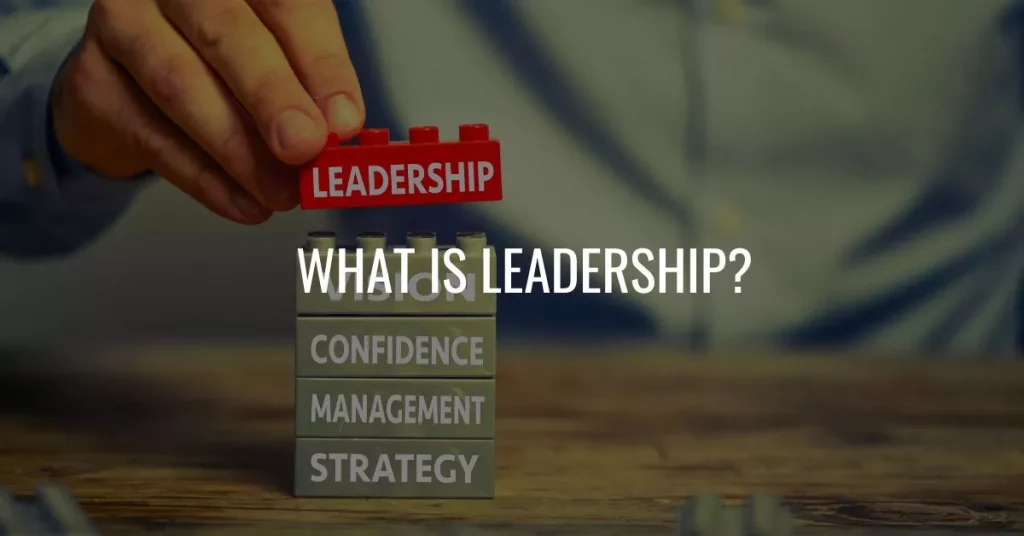What Is Leadership?
All right! It’s a good place to start obviously asking the question what is leadership? When we look at leadership, that’s easier sometimes to start with what it isn’t?

Leadership is not about position or title or seniority:
I think it’s important to show that leadership definitely has nothing to do with your position or your seniority in a company.
A lot of times people talk about an organization’s leadership, and they’re referring to the most senior executives at the top, but remember leadership doesn’t always happen when you reach a certain pay grade; it happens all throughout the organization; in fact, most leadership happens at the middle and below.
It also has nothing to do with titles, and just because you have that title doesn’t automatically make you a leader, you know your title is only going to carry you so far, that it doesn’t anything to do with your titles.
Leadership is not about your personal attributes:
Also, leadership has nothing to do with your personal attributes; you know I talked about so many times in my early phases of leadership, I was so wrapped around the word or the thought of charisma thinking; it had to be my personal attributes; I had to be tall a booming voice, a square jaw; but the leadership is not those things, the charisma is all about learning how to be calm, confident, consistent and courageous, that’s going to help you develop your own natural charisma, not your leadership.
Leadership is not about management:
leadership is not management, sometimes we use it synonymously; but it’s exactly different, they’re not synonymous; you know if you manage things you manage processes, you need to plan, measure, coordinate, hire, and fire. And as you see managers manage things but leaders lead people.
So what is leadership?
You know sometimes, it’s fun to look at some of the best quotes on leadership and what people think about them, and there are some well-known leadership gurus.
- Warren Bennis: “leadership is the capacity to translate vision into reality”
- Napoleon said: “a leader is a dealer in hope”
- Peter Drucker says: “a leadership is lifting a person’s vision to high sights the raising of a person’s performance to a higher standard, the building of a personality beyond his normal limitations”
- and then, of course, John Maxwell: “leadership is influence nothing more nothing less”
So again what is leadership? You know it certainly encompasses far more than what most the thinks; it certainly starts with the leadership of yourself, the leadership of others, the leadership of leaders, business-level leadership, enterprise-level leadership ………….etc.
But if you had meant an elevator I had three floors to give you my definition of leadership; it would simply be this:
Leadership is: the facilitation of a process of tapping into unlimited human potential and turning it into desired results
Before discussing that definition; let’s first focus on talent. Of course, we’re all given and born with these God-given talents, right? but talent isn’t enough, you know talent does not equal results; we put a huge emphasis on talent in this society; but if Talent equaled results then all successful people would be talented, and then all unsuccessful people will be untalented, and that’s not true and we know this from our own personal observations, don’t we? How many talented people just don’t seem to get the results they deserve? On the flip side, how many successful people do you know who seem to lack talent? Again they’re everywhere! Aren’t they?
Look, talent will help you to be good at something if you were put on this earth to do something. If you wanted to be a pilot, you have to be a good pilot; talent is a given but it’s not enough on its own and something else is needed to drive sustainable results and that catalyst is necessary to crystallize this unlimited human potential into results; this thing is leadership
You know one of my favorite books when I was going through the certification process with John Maxwell is “talent is never enough” he’s got some interesting statistics in this book and I want to share them with you here.
- One of them is that more than 50% of all CEOs of Fortune 500 companies graduated with a C or C ⁻
- I find these interesting statistics that 65% of all US senators came from the bottom half of the graduating class.
- 75% of all our US presidents are the same thing, came from the bottom half of the graduating class.
- And my favorite statistic here is more than 50% of all millionaire entrepreneurs never even finished college if they even started at all.
So we should re-examine some of our beliefs around why people are successful, talent is a given but we must earn success because here’s the reality about leadership and success, how well you lead determines how successful you are, it’s as simple as that how well you lead determines how successful you are in every aspect of your life.
Leadership Lid.
Your leadership skills and ability are at this particular moment that literally is the “lid” of your leadership potential; you put it into context this way; your ability to cast a vision, to build a team, to get the right people on the bus, to get the wrong people off the bus, get the right people in the right seats on the bus and to get the bus going in the right direction; all of that is going to be capped by your leadership ability and it cannot rise higher than your leadership ability.
What happens if people get assigned leadership positions because of their talent?
We see examples of this all the time; Most people don’t get assigned leadership positions because of their ability. Look how most people get assigned leadership positions. I’m sure you’ve seen this in your own experience. People usually are not selected because of their leadership ability. It sounds crazy; right! But it’s true. Most people are chosen for their leadership position because they were successful in some certain technical ability in their previous position.
For example, the best accountant becomes a team leader of the accounting team; and that seems to make perfect sense. I mean “Billy” the bean counter counts beans better than anybody else; so we want everybody else to count beans like Billy; so Billy is paid his dues; he counts beans well; let’s make him the leader of all the bean counters; makes perfect sense; until you realize that the skill set to be the best accountant is completely different and totally different than being the accounting team leader. It’s easy to see what happens; right! You lose a great accountant, and you gain a bad leader.
Everyone starts scratching their heads! What happened? Why didn’t it work with Billy? The team is upset, and Billy is upset; wondering! How did this rising star fizzle out? It’s because Billy’s “leadership lid” was too low, his abilities were low at the time.
The team could be the most talented group of people, but those achievements will never rise above the “leadership lid” of the leader; so say you’re an average leader; say your “leadership lid” is a five; your business organization; your team or your family it’s going to be a four or three at best; it will be a five but we’re more realistically to be a four or three; the potential is there to go higher but the leadership ability caps the potential.
How to raise your leadership lid:
But please don’t misunderstand me when I say that the potential is capped, I don’t believe potential is limited; I subscribed to Maslow’s theory that “we all have unlimited potential”. At least, all the potential that we use or need; but our “leadership lid” caps this unlimited potential; therefore we need to focus and learn how to raise our “lid” to let more potential flow through.

It’s kind of like two table lamps plugged into the same unlimited power source; they’re both plugged into the same potential, they are plugged into more potential than they’ll ever need, and one lamp is going to be brighter than the other one; it’s not because the potential is different, they’re trapped in the same potential; the reason why one becomes brighter than the other is that one allows more potential to flow through the brighter bulb the 70-watt bulb allows more of that unlimited potential to flow through than the 50-watt bulb; therefore producing brighter results; your “leadership lid” works exactly the same way.
So how do you raise your lid? That’s the secret, right!
- It certainly begins with “intentionality”.
- Understanding that leadership is teachable; it’s a learnable skill.
- Understanding that it’s a lifelong process; that develops day by day by day not in a single day, but every day.
- Understanding that you’ve got to grow and to grow you’ve got to get in the “growth zone” and understand that this is a process like any other process.
Note: what is the growth zone? It isn’t the comfort zone, it’s intentionality, it’s a contract with yourself, it’s an inside thing, the good news is you don’t have to go anywhere to grow.
And I find great comfort zone really; it’s the perfect curriculum for your personal growth,
are the circumstances you find yourselves in right now, you don’t need to wait for anyone or anything or go anywhere; you just have to opt-in, you just have to choose to capitalize in every situation, to extract the learning, to extract the growth; and understanding that every interaction, every situation; you encounter is an opportunity for leadership and growth; and when you accept this awareness and willingness to grow. You’re well on your way to raising your “leadership lid”, and understanding what is leadership?
How to develop your leadership skills
Getting around people who think differently from you; you want to become a better golfer? What do you do? You call your drinking buddies to play golf with you? No! you call your drinking buddies when you want to have fun playing golf; you want to become a better golfer you surround yourself with better golfers; it’s the same with leadership you want to be a better leader, and you get around better leaders, and it’s a huge step being part of this mastermind;
Everything we talk about on this site you’ve heard throughout your life; leadership is very easy to understand, what is leadership? It’s easy to understand, but it’s difficult to implement because courage and authenticity are required, so how do you go about developing it? Well! You’ve made the great first step in intentionality it’s all about developing a courageous authentic presence
- Stop trying to be something you’re not.
- Stop wearing masks.
- Stop focusing on false charisma, and a larger-than-life presence.
- Stop focusing on position and title
And instead, start dedicating your life to pursuing a path on what it takes to be calm to be consistent to be confident to be courageous in every aspect of your life

Patrick is a lifelong learner and personal development blogger whose work focuses on mindset shifts, emotional growth, and the hard-won lessons from real-life challenges.
Qualities: Relatable, honest, introspective, growth-oriented.
